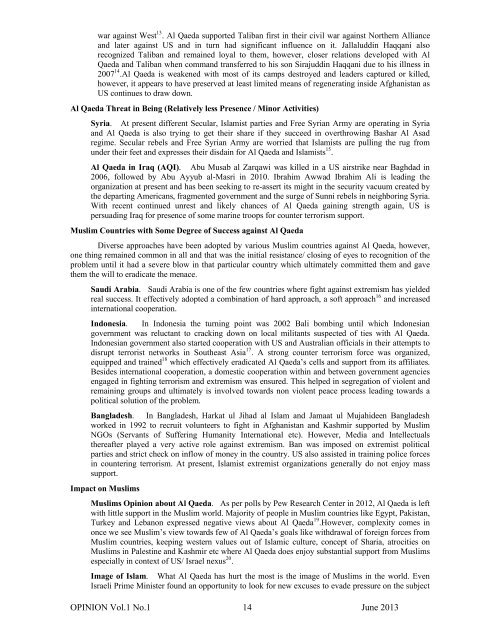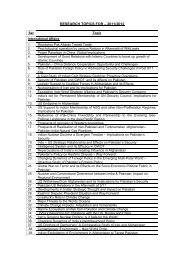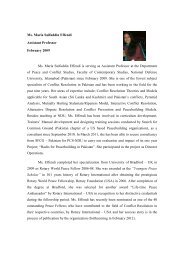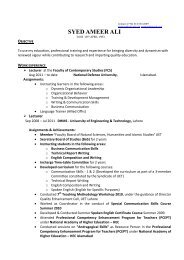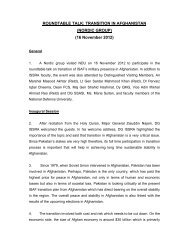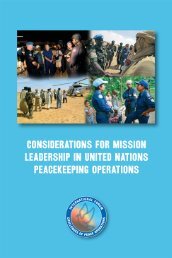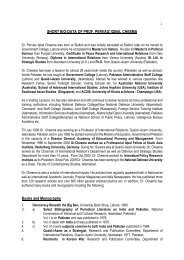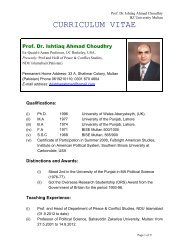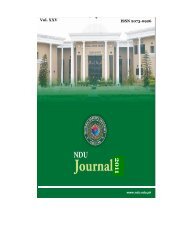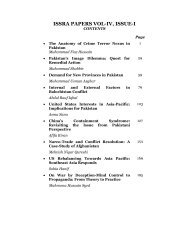OPINION Vol.1, No.1 June 2013 - National Defence University
OPINION Vol.1, No.1 June 2013 - National Defence University
OPINION Vol.1, No.1 June 2013 - National Defence University
Create successful ePaper yourself
Turn your PDF publications into a flip-book with our unique Google optimized e-Paper software.
war against West 13 . Al Qaeda supported Taliban first in their civil war against Northern Alliance<br />
and later against US and in turn had significant influence on it. Jallaluddin Haqqani also<br />
recognized Taliban and remained loyal to them, however, closer relations developed with Al<br />
Qaeda and Taliban when command transferred to his son Sirajuddin Haqqani due to his illness in<br />
2007 14 .Al Qaeda is weakened with most of its camps destroyed and leaders captured or killed,<br />
however, it appears to have preserved at least limited means of regenerating inside Afghanistan as<br />
US continues to draw down.<br />
Al Qaeda Threat in Being (Relatively less Presence / Minor Activities)<br />
Syria. At present different Secular, Islamist parties and Free Syrian Army are operating in Syria<br />
and Al Qaeda is also trying to get their share if they succeed in overthrowing Bashar Al Asad<br />
regime. Secular rebels and Free Syrian Army are worried that Islamists are pulling the rug from<br />
under their feet and expresses their disdain for Al Qaeda and Islamists 15 .<br />
Al Qaeda in Iraq (AQI). Abu Musab al Zarqawi was killed in a US airstrike near Baghdad in<br />
2006, followed by Abu Ayyub al-Masri in 2010. Ibrahim Awwad Ibrahim Ali is leading the<br />
organization at present and has been seeking to re-assert its might in the security vacuum created by<br />
the departing Americans, fragmented government and the surge of Sunni rebels in neighboring Syria.<br />
With recent continued unrest and likely chances of Al Qaeda gaining strength again, US is<br />
persuading Iraq for presence of some marine troops for counter terrorism support.<br />
Muslim Countries with Some Degree of Success against Al Qaeda<br />
Diverse approaches have been adopted by various Muslim countries against Al Qaeda, however,<br />
one thing remained common in all and that was the initial resistance/ closing of eyes to recognition of the<br />
problem until it had a severe blow in that particular country which ultimately committed them and gave<br />
them the will to eradicate the menace.<br />
Saudi Arabia. Saudi Arabia is one of the few countries where fight against extremism has yielded<br />
real success. It effectively adopted a combination of hard approach, a soft approach 16 and increased<br />
international cooperation.<br />
Indonesia. In Indonesia the turning point was 2002 Bali bombing until which Indonesian<br />
government was reluctant to cracking down on local militants suspected of ties with Al Qaeda.<br />
Indonesian government also started cooperation with US and Australian officials in their attempts to<br />
disrupt terrorist networks in Southeast Asia 17 . A strong counter terrorism force was organized,<br />
equipped and trained 18 which effectively eradicated Al Qaeda’s cells and support from its affiliates.<br />
Besides international cooperation, a domestic cooperation within and between government agencies<br />
engaged in fighting terrorism and extremism was ensured. This helped in segregation of violent and<br />
remaining groups and ultimately is involved towards non violent peace process leading towards a<br />
political solution of the problem.<br />
Bangladesh. In Bangladesh, Harkat ul Jihad al Islam and Jamaat ul Mujahideen Bangladesh<br />
worked in 1992 to recruit volunteers to fight in Afghanistan and Kashmir supported by Muslim<br />
NGOs (Servants of Suffering Humanity International etc). However, Media and Intellectuals<br />
thereafter played a very active role against extremism. Ban was imposed on extremist political<br />
parties and strict check on inflow of money in the country. US also assisted in training police forces<br />
in countering terrorism. At present, Islamist extremist organizations generally do not enjoy mass<br />
support.<br />
Impact on Muslims<br />
Muslims Opinion about Al Qaeda. As per polls by Pew Research Center in 2012, Al Qaeda is left<br />
with little support in the Muslim world. Majority of people in Muslim countries like Egypt, Pakistan,<br />
Turkey and Lebanon expressed negative views about Al Qaeda 19 .However, complexity comes in<br />
once we see Muslim’s view towards few of Al Qaeda’s goals like withdrawal of foreign forces from<br />
Muslim countries, keeping western values out of Islamic culture, concept of Sharia, atrocities on<br />
Muslims in Palestine and Kashmir etc where Al Qaeda does enjoy substantial support from Muslims<br />
especially in context of US/ Israel nexus 20 .<br />
Image of Islam. What Al Qaeda has hurt the most is the image of Muslims in the world. Even<br />
Israeli Prime Minister found an opportunity to look for new excuses to evade pressure on the subject<br />
<strong>OPINION</strong> <strong>Vol.1</strong> <strong>No.1</strong> 14 <strong>June</strong> <strong>2013</strong>


